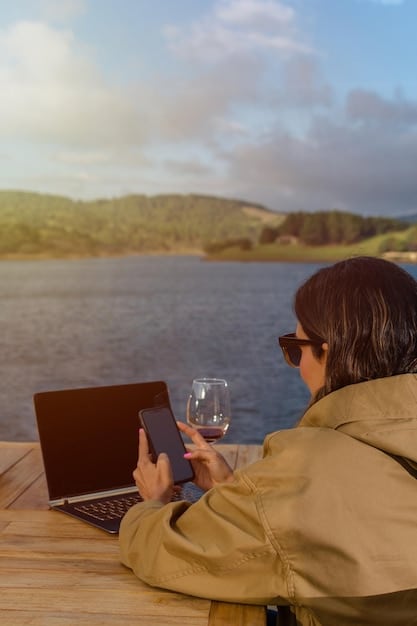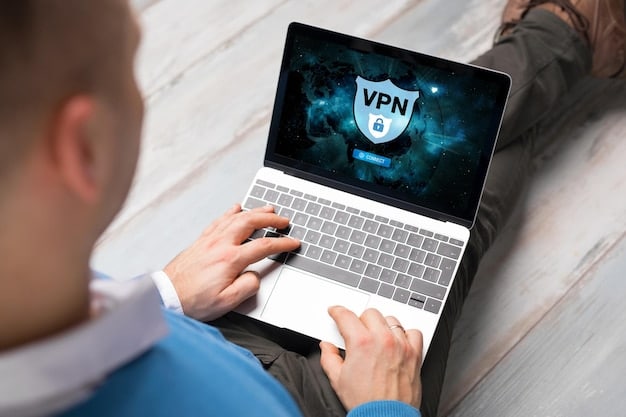Digital Nomad Safety: US Travel Scams to Avoid in 2025

Digital nomad safety is paramount when traveling the US in 2025; knowing how to navigate potential scams, secure your data, and stay safe in unfamiliar environments is crucial for a successful and worry-free nomadic journey.
Embarking on a digital nomad journey across the US in 2025 offers unparalleled freedom and adventure, but it also presents unique safety challenges. Staying informed and prepared is the key, so you can focus on your work and exploration without worry. Let’s dive into the essential aspects of digital nomad safety: avoiding scams and staying secure while traveling the US in 2025.
Understanding Digital Nomad Safety in the US
The digital nomad lifestyle has surged in popularity in the US, attracting individuals seeking the freedom to work and travel simultaneously. With this increase comes the need for greater awareness and preparedness when it comes to safety. You need to be aware of your surroundings, your belongings, and your digital security.
Understanding the specific safety concerns that digital nomads face in the US is the first step toward mitigating potential risks. This includes everything from petty theft to sophisticated online scams. So, staying informed and proactive is essential for a secure and fulfilling experience on the road.
Common Safety Threats for Digital Nomads
Digital nomads are particularly vulnerable to scams and theft due to their constant travel and reliance on technology. Therefore, it’s important to understand the threats to proactively protect against them.
- Theft of Devices: Laptops, tablets, and smartphones are prime targets for thieves, especially in crowded tourist spots.
- Wi-Fi Hacking: Public Wi-Fi networks are notoriously insecure, making your data vulnerable to hackers.
- Scams Targeting Travelers: From fake accommodation listings to fraudulent tour operators, scammers often prey on unsuspecting travelers.
Being aware of these threats will help you stay vigilant and take the necessary precautions to protect yourself and your belongings.

Staying Aware of Local Laws and Regulations
Navigating the legal landscape of different states and cities can be complex for digital nomads. Each location may have its own laws and regulations regarding short-term rentals, business operations, and general conduct. Failing to comply with these local rules can lead to legal troubles and financial penalties. Some towns are more welcome to digital nomads and remote employees than others.
Researching local laws and regulations before arriving in a new location can help you avoid these pitfalls. Resources such as local government websites, legal advice forums, and digital nomad communities can provide valuable insights.
Ultimately, you want to be able to work and travel without the unwanted interference of local law enforcement. By taking a few simple steps, the chances of unnecessary interactions can be significantly reduced.
By understanding the safety landscape, digital nomads can create a plan and avoid some unfortunate issues. This includes being aware of threats, understanding local laws, and knowing how to react in unexpected situations.
Avoiding Accommodation Scams
Finding safe and reliable accommodation is crucial for digital nomads. Unfortunately, accommodation scams are prevalent, especially on online platforms. It’s not always easy to tell what is a scam and what is real. Below are a few things to be aware of.
Learning to spot these scams and taking proactive measures can save you from significant financial loss and potential safety risks. A little research can go a long way.
Red Flags in Accommodation Listings
Many scammers use different tactics to gain your trust. One of the most common accommodation scams are to lure you in with extremely reduced rates. You need to know the red flags to look for when searching for accommodations.
- Unrealistic Prices: If a listing seems too good to be true, it probably is. Compare prices of similar accommodations in the area to gauge the legitimacy of the offer.
- Requests for Upfront Payments: Be wary of landlords or hosts who demand full payment before you’ve even seen the property.
- Lack of Reviews or Verification: Listings with no reviews or a lack of verified information should be approached with caution.
It’s always a good idea to investigate the property using multiple resources. If there is an address listed, it can be researched on the city and county official records. Any anomalies uncovered should be another reason to move on.
Secure Booking Practices
To protect yourself from accommodation scams, adopt secure booking practices. Use reputable platforms with built-in security features and always verify the legitimacy of the listing before making any payments.
Platforms like Airbnb and Booking.com offer protection policies and verification processes that can help safeguard your money. If you choose to book directly with a property owner, perform thorough background checks and request references.
The first step is understanding a property and its owner. The second step is choosing a booking process that protects both parties without putting you in a vulnerable situation. By taking a few precautions, accommodation scams can be easily avoided.
By being aware of the red flags and taking secure booking practices, you can significantly reduce your risk of becoming a victim of accommodation scams, ensuring your safety and security while traveling.

Protecting Your Digital Security
Digital nomads rely heavily on technology for work and communication. With this reliance comes an increased risk of cyber threats. Digital security needs to be paramount in your planning, and you should always take precautions regarding the handling of your sensitive information.
Implementing robust security measures is essential to protect your sensitive data and prevent unauthorized access to your devices and accounts. It’s an easy thing to put off since you don’t notice the benefits of doing so, but it’s just the same as putting on a seatbelt before operating a motor vehicle.
Using VPNs and Secure Wi-Fi Practices
Public Wi-Fi networks are notoriously insecure, making them prime targets for hackers. Using a Virtual Private Network (VPN) can encrypt your internet traffic and protect your data from prying eyes. These are just some of the many ways to secure your information.
Always connect to secure Wi-Fi networks that require a password and avoid conducting sensitive transactions, such as online banking, on public Wi-Fi. If you need to use public Wi-Fi, make sure your VPN is active.
- Always Use a VPN: A VPN encrypts your internet traffic, preventing hackers from intercepting your data.
- Avoid Public Wi-Fi for Sensitive Tasks: Refrain from online banking and shopping on unsecured public networks.
- Use Strong Passwords: Create strong, unique passwords for all your accounts and use a password manager to store them securely.
If you are working on a local computer instead of a company computer, that can put your sensitive business data at risk. Always make sure that you comply with the best practice recommendation by your company for digital security.
Safeguarding Personal Information
Protecting your personal information is critical for minimizing the risk of identity theft and fraud. Be cautious about sharing sensitive data online and always verify the legitimacy of websites and emails before entering personal details.
Enable two-factor authentication (2FA) on all your important accounts for an extra layer of security. This requires a second form of verification, such as a code sent to your phone, in addition to your password. If someone knows your password, they won’t be able to log in without your phone.
Identity theft can cause some serious problems between banks, creditors, and your personal life. This is why digital security needs to be a top priority when working as a digital nomad.
By implementing these digital security measures, you can create a safer online environment and protect your valuable data from cyber threats, allowing you to work and travel with peace of mind.
Health and Safety Considerations
Health and safety are critical for digital nomads. Traveling to new places can expose you to various health risks and challenges. This could be catching a local illness that you weren’t expecting or having a negative experience with new foods.
Here are some steps you can take to ensure that you are physically and mentally prepared to live a nomadic and free lifestyle.
Accessing Healthcare on the Road
One of the significant challenges for digital nomads is accessing healthcare while traveling. Health insurance policies may not cover you in all locations, and finding reliable medical professionals in unfamiliar areas can be difficult. There are some insurance policies that are targeted specifically for digital nomads.
- Research Local Healthcare Options: Before traveling to a new location, research local hospitals, clinics, and doctors.
- Carry a Medical Kit: Pack a comprehensive medical kit with essentials like pain relievers, first-aid supplies, and any prescription medications you require.
- Mental Health Check-Ins: Traveling without structure can have negative consequences. It would be a good idea to seek assistance from a mental health professional on a consistent basis.
It is important to have a plan on how you are going to deal with health situations before they become a problem. If you only plan in the moment, it can be much more stressful and the options might be more limited.
Staying Safe in Unfamiliar Environments
Navigating unfamiliar environments can also present safety challenges for digital nomads. Be aware of your surroundings, especially in crowded or poorly lit areas. Research local customs and social norms to avoid inadvertently offending or attracting unwanted attention.
Avoid walking alone at night and always let someone know your whereabouts. Use ride-sharing apps or public transportation instead of walking long distances in unfamiliar areas.
By addressing these health and safety considerations, you can minimize risks and ensure a healthy and secure digital nomad experience, allowing you to focus on exploring new places and pursuing your professional goals.
Financial Safety Tips for Digital Nomads
Effective financial management is crucial for digital nomads. Managing your finances while traveling can be challenging, especially with fluctuations in income and varying expenses.
There are some important steps that every digital nomad can take to ensure that they are financially secure.
Budgeting and Expense Tracking
Creating a budget and tracking your expenses are essential for maintaining financial stability on the road. Use budgeting apps or spreadsheets to monitor your income and expenses, and identify areas where you can cut back. It’s also a good idea to create a line item for emergencies.
- Use Budgeting Apps: Apps like Mint or YNAB can help you track your income and expenses in real-time.
- Set Financial Goals: Establish short-term and long-term financial goals to stay motivated and on track.
- Automate Savings: Set up automatic transfers from your checking account to your savings account each month.
Being a digital nomad is a great experience, but it shouldn’t come at the stake of your personal finances. By being prepared, you can both take amazing trips and be financially stable.
Avoiding Financial Scams
Be wary of financial scams targeting travelers, such as fake ATM machines, currency exchange fraud, and phishing emails. Always use reputable ATMs and currency exchange services, and never share your financial information with unverified sources.
Report any suspicious activity to your bank and local authorities immediately. Monitor your bank accounts and credit reports regularly for any unauthorized transactions.
Having a separate bank account for your business can also help you keep personal and business expenses separate. This can make a huge difference when tax season arrives. Another pro tip is to pay all business expenses using a credit card in your business’s name.
In summary, you can be financially secure by budgeting, avoiding scams, and building up savings. By protecting yourself, you can ensure that your time as a digital nomad is relaxing and fun.
Staying Connected and Informed
Staying connected and informed is essential for digital nomads. Access to reliable communication tools and up-to-date information can help you stay safe, productive, and connected to your loved ones. Technology allows those who travel to deal with any potential hurdle that might arise.
Making sure that you have easy access to the internet, reliable communication, and local data are key preparations before taking a trip.
Using Local SIM Cards and Mobile Hotspots
Consider purchasing a local SIM card or using a mobile hotspot to ensure reliable internet access while traveling. Local SIM cards offer affordable data plans and can be more secure than public Wi-Fi. Always be aware of what your options are.
Mobile hotspots provide a portable and secure internet connection, allowing you to work from anywhere. Be sure to research different providers and choose a plan that meets your needs.
- Research Local Providers: Compare data plans and coverage maps to find the best option for your travel destinations.
- Disable Automatic Connections: Prevent your devices from automatically connecting to untrusted Wi-Fi networks.
- Keep Software Updated: Install the latest software updates on your devices to patch security vulnerabilities.
This can be a source of stress when traveling. The digital nomad life should be fun and relaxing, not something that causes stress.
Leveraging Digital Nomad Communities
Join online and offline digital nomad communities to exchange information, seek advice, and connect with fellow travelers. These communities can provide valuable insights on local safety tips, accommodation recommendations, and networking opportunities.
Participate in local meetups and events to build relationships with other digital nomads and local residents. Sharing experiences and knowledge can enhance your safety and overall travel experience.
Staying connected and informed is essential for ensuring safety as a digital nomad. This is why taking measures like seeking out digital nomad communities and knowing how to access the internet are keys to being successful.
| Key Point | Brief Description |
|---|---|
| 🔑 Accommodation Scams | Be wary of unrealistic deals and always verify listings. |
| 🛡️ Digital Security | Use VPNs; protect your personal information and strong passwords. |
| 🏥 Health Access | Having access to healthcare while abroad can alleviate potential headaches. |
| 🤝 Community | Joining digital nomad communities can help offer invaluable insights. |
Frequently Asked Questions
▼
Common scams include fake accommodation listings, phishing emails for financial information, and fraudulent job offers targeting remote workers. Always do your research before making payments.
▼
Always use a VPN when connected to public Wi-Fi to encrypt your internet traffic and protect your data from potential hackers. Avoid conducting sensitive transactions on public networks.
▼
Immediately report the theft to local authorities and your insurance provider. Remotely wipe your device if possible, and change passwords for all your important accounts to prevent unauthorized access.
▼
Use reputable booking platforms, read reviews carefully, and verify the listing’s authenticity. Contact the host with questions before booking, and trust your instincts if something seems off.
▼
Travel insurance is a must-have for digital nomads. It can cover unexpected medical expenses, trip cancellations, and loss of personal belongings. Research plans tailored to digital nomads.
Conclusion
Staying safe as a digital nomad in the US involves being proactive about your physical and digital security. By staying informed, implementing practical safeguards, and making smart choices, you can enjoy the freedom and adventure of the nomadic lifestyle with confidence and peace of mind.





